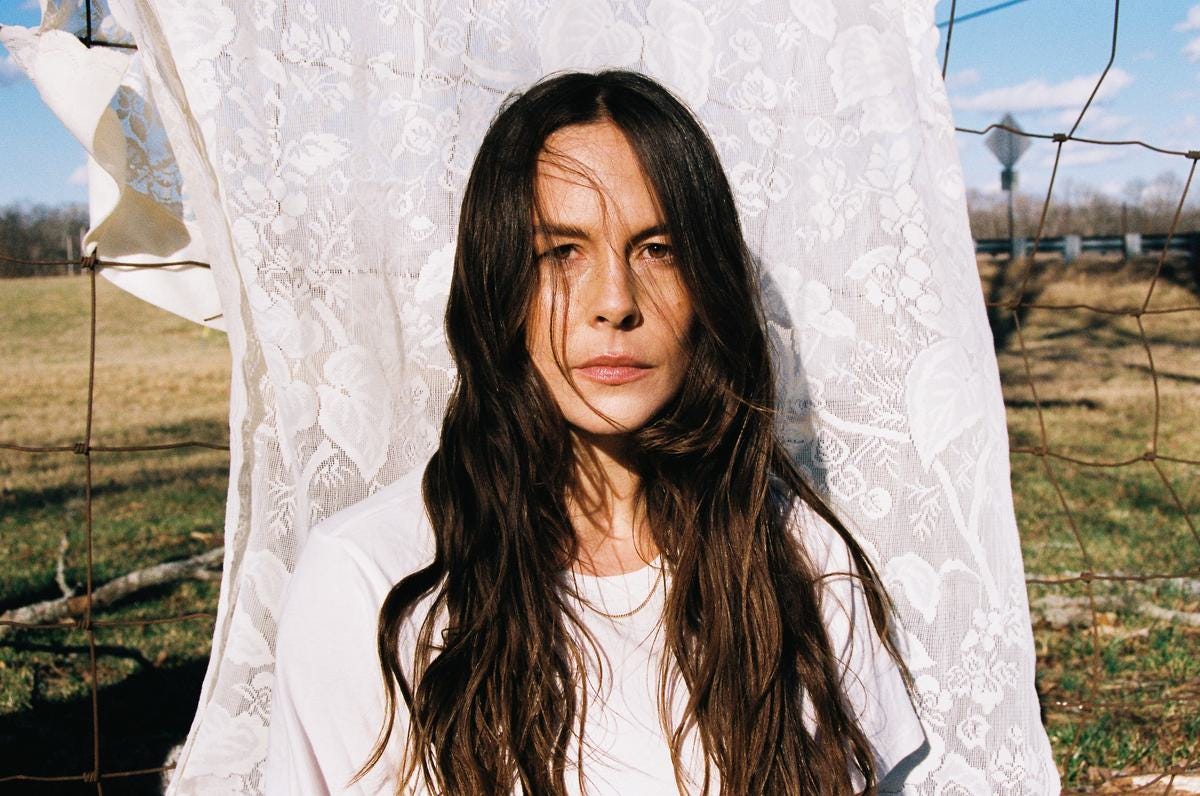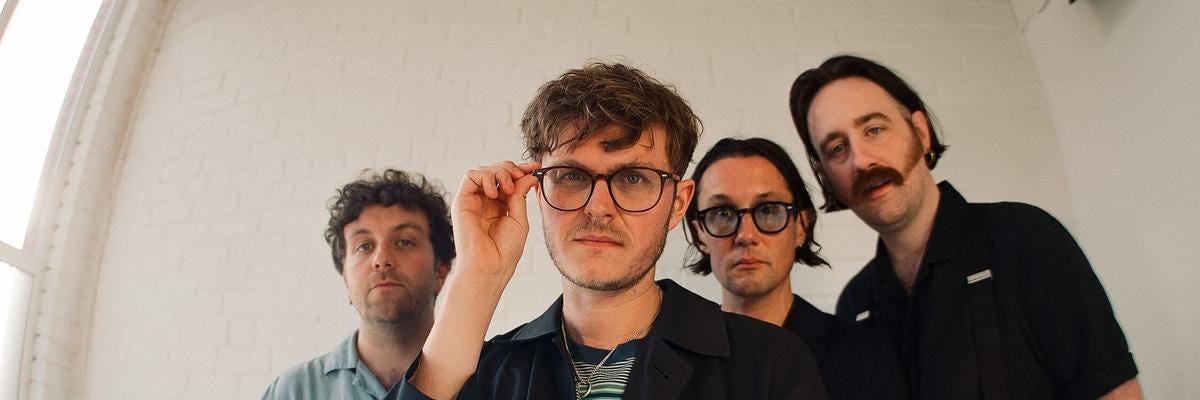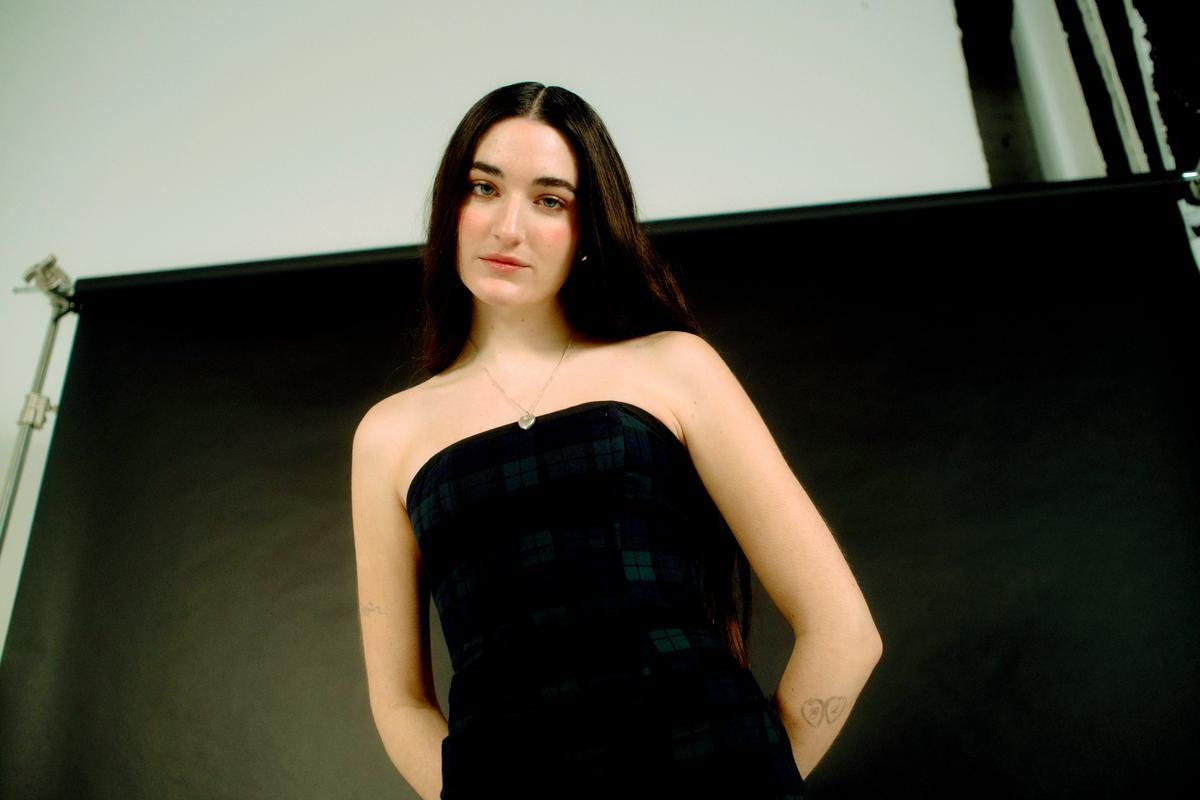The spectacular rebirth of Madi Diaz
If there is one theme of my conversation with Madi Diaz, it is blind — or, to borrow a phrase, ‘weird’ — faith. With every good thing that’s happened to Diaz since History Of A Feeling, there has been that creeping, tingling distrust from years past following not far behind. Baggage, if you will. Part of Diaz’s work not just as an artist but as a person, she tells me, has been letting all of that go. That, she tells me, is what Weird Faith is about. Trusting the goodness of her new managers, trusting her label, trusting her place in a business that can often be a boys’ club, trusting newness in all its forms. This record, she explains, is simply trying to process that one central feeling of finding your faith again in all its forms and iterations.
“I feel like my ‘give-a-fuck’ is quite a bit lower,” she says. Even though she qualifies the statement with a laugh, she’s still being serious. “I don’t feel as apologetic. I’m a little bit less: ‘Do you like it???’ I feel a little bit more focused on: ‘Do I feel this thing? When I’m handing this over, do I feel rung like a bell at my core and so excited to part with it and share it?”
That new trust wasn’t all business, though. While the pain of Diaz’s first retreat from the industry was compounded by a fracturing romance, her dive back into it came as a new relationship blossomed as well, a bookend on each era so narratively satisfying it’s so tempting to think Someone Up There had it all planed out for her. Of course, nothing is so simple. That new love has since come and gone, but Diaz speaks on it with gentle acceptance. She even trusts that dissolution happens for a reason, too.
“There’s a song called ‘Hurting You’ that I wrote a while back, after my relationship that inspired History Of A Feeling ended and I was starting to get back out there and talk to people. I mean, even talking to like my brother or my parents. I was just so spiky. I just felt like a porcupine, and I was so protective,” she says with a pause, getting emotional and taking a moment to collect herself. “It was this moment of trying to figure out how to be vulnerable after you haven’t been handled with care.” ‘Hurting You’ is one of many tracks on Weird Faith that have that rip-your-heart-out quality to it. Diaz brings her lyrical power to the table once again, and her storytelling is surely the highlight of the album. Supporting that writing prowess are tender country, folk, and bluegrass-tinged arrangements, in true Nashville style.
But one that’s stood out from the rest is the record’s second single, ‘Don’t Do Me Good.’ Featuring Kacey Musgraves, who is now a personal friend of Diaz, the track handles those moments of wanting what you can’t have. Or, more specifically, wanting what you know is wrong for you but not being able to pull yourself away.
“I wrote that song over Zoom with Amy Wadge. We were talking about the music industry, and we were talking about how many times you walk away from something and how something can be so good for you and so bad for you at the same time,” she tells me. “But I just needed a buddy on that song because it was so sad singing it alone. And Kasey’s become a buddy [in Nashville], so I lucked out.”
On the eve of Weird Faith’s release, Diaz tells me she’s got nothing but excitement. “This record kind of caught me off guard a bit,” she says and smiles. Of course, with the new album comes another tour, another promotion cycle, another turn in the ringer again. But she assures me that now, finally, she’s got a team around her that make it all worth it. “We’re still waiting to catch lightning in a bottle,” she says. “But we’re ready for it.”
Yard Act on “People Who Died” by The Jim Carroll Band / Patti Smith
It was Patti Smith covering this song when I first heard it, and I don't actually know if there's a version of it available. This links back to “Bill McCai.” My old friend Joe, who I was in a band with, and we went to see The Coral together, sadly died when he was 19. At his funeral a gang of us played “Bill McCai”, “Clint Eastwood” and “Crazy Rap” by Afroman – it’s a good job camera phones didn’t exist.
Joe died and then I went to uni feeling I was leaving everything behind, I carried this with me and I thought about him a lot. But at the time, I swore I was never going to be in a band again, which was overly dramatic of a 19-year-old that's just been through something quite hard. I was going to make beats on my computer basically, that's where I thought my life was going.
Then we went to Roskilde Festival, me and a lad called Luke I'd met at uni in first year and my mate Dan from back home. We went because Pavement were playing, and we used our student loan right at the start of the year to buy the tickets. I saw Prince that weekend, which was fucking wild.
I watched Patti Smith, she did this song and said it was dedicated to anyone who'd ever lost anyone they loved. In that moment I thought about Joe, it was probably about a year on from his death and it was one of those very, ‘the earth stood still’ moments, everyone around me seemed to not exist. I was completely focused on Patti Smith delivering this song with such passion as she always does - I don't think anyone covers a song like Patti Smith.
Ever since I've always thought about that song, because it does that thing where it belittles death almost entirely, it reduces death to ‘people die, then they're gone, and they just go’. But the spirit of it is remembering them, and I think the duality of those two things, the lack of sentimentality combined with the fact that it's clearly so heartfelt is really important to me. I've never forgotten that performance. I can see it; it's playing in front of my eyes right now in my head.
I felt like that moment felt like closure. I didn't think about him very much after that for a long time because life started happening, he would crop up but the further away you get from something, it exists differently. You learn to live your grief in a different way I suppose.
Since having my son, I've thought about Joe a lot more. I keep projecting my own son onto my childhood. I keep remembering all these pieces of my past with me in the scenario, but instead of my face, it's my 2-year-old boy's face, which is quite a strange image, but I keep putting him into situations I was in. I think that's all to do with coming to terms with slowly letting go of him already. But yes, that song is beautiful. The original's great as well.
Etta Marcus is On The Rise
Abandoning her first year at London's Trinity Conservatoire after finding the jazz school's more stringent, technicality-focused delivery not offering the creative outlet Marcus required, was one of the first big fears Etta Marcus had properly faced. The next came in a simple moment that's shaped her career to this point: "It was probably having the balls to put something out on SoundCloud. That was the big moment for me because I'm such a perfectionist – like most artists are – and it's hard to press the ‘Done’ button,” she laughs now.
Fortunately, she had the support of her parents, who were the ones eventually nudging her to upload, clicking her fate into place. "It doesn't matter if it's not done, just do it, nothing's gonna happen. If you do nothing, something might happen if you do something," she recalls them saying. On the back of this upload, Marcus was approached by her first industry contact. "That's how everything started for me," she recalls. "The first person that contacted me actually was my now-lawyer, which I was like, there are music lawyers...like what is that? I also didn't trust them at all! Everything was a scam to me. So it took me a while to actually respond. But from there, it was this domino effect of manager and collaborators and all that kind of stuff – having the guts to do that really helped."
It's this tentative certainty that embodies Marcus' career. It's the all-in thematic nature of her concepts, and even physically removing herself from the usual retinue of writing and collaborating to reach a new level. "With this mini-album, I spent a lot more time by myself on purpose," she explains. "Not for the whole tortured artist thing but I just felt that I wanted to write more stuff completely by myself, like I did before."
Having written her past music – including 2022’s View From The Bridge EP – with suave songster Matt Maltese, for The Death of Summer... Marcus uprooted herself to her childhood escape of Whitstable. Visiting the North Coastal town since the age of 12, it's become a beacon for Marcus, and her flourishing creativity. She imbues her surroundings in these visits. "When I go in the winter, and it's not half term, it's just completely empty. It's really spooky," her face glows with the memories. "No one's there. And you're right by the ocean [so] I think my environment impacts [the songwriting] a lot."
Nodding to her childhood in South London, she recognises that the city environment made its mark on her earlier, more dissonant music. The Death of Summer's... blending of harsher and softer moments – akin to a wintery sea chewing at the stoic coast – could only have happened from her sojourn. "It was the harsh conditions of being by yourself, no one is there, it's cold, shops are closed at like two o'clock. You're not eating nice because I can't cook for shit...but then at the same time, I went in the summer of last year, and it was a completely new sound like I did ‘Little Wing’ and I did ‘Girls That Play’ and it's just so much more bright, and so much softer."
Marcus' music indeed lends itself to this isolation. But it's within this she reaches in and finds a companionship that echoes and radiates warmly to all who listen. Part of this comes from her style of writing herself "into the songs", as she puts it, to find a place of confidence and buy-in that listeners can also hang onto. "When I was writing early on I was bad at even writing lyrics down on a piece of paper because they had to be so fully formed in my head. Nothing could be bad out loud, and it was really crippling. It inhibited me from actually just getting to a place of finding the thing that I want to release, it would stop me. So over the course of the last two years I've managed to dial that back and be a bit more free in my writing and allowing things to not be so good. So, when I say writing into, it's more being able to be okay with writing more instead of perfectionism getting in the way."
Marcus' music is constructed around an understanding – tender moments written to embody a generational feeling – that's especially coming to fruition in her live shows. With the release of her debut mini-album in January, Marcus has found her noir world coming to life. Recently, devotees came to her release tour embodying the funeral chic aesthetic embodied throughout the Death of Summer visuals. "I would see people dressed in like mourning attire," Marcus marvels. "You just feel like a little group of friends, you get together and have a fun night. But it's great that people feel like they can and add themselves to it."
This plays right into Marcus' ambitions. "I need everything surrounding it to be just as...good or just as creative," she thoughtfully explains. "And so I want people to experience it and to feel like that they're a part of something." Her inspiration for this comes from the acutely apparent likes of Lorde and Tyler, The Creator – artists who "build their own universe without asking for anyone to do anything" – to the more confined ideas of Fiona Apple and Mazzy Star. It’s the embodiment of personality, which in turn is something that Marcus is cautiously aware of. "I don't like the idea of commodifying a personality, it feels a bit weird," she shrugs lightly. "You can get that, but I've never tried and forced anything. I definitely want my personality to come through my songwriting...the whole personality thing I've always struggled with a little bit just because I don't want to run the risk of that being my selling point. I want my music to be the selling point."
Three things to get excited about this week
The exhibit: This week, Yoko Ono’s latest show, YOKO ONO: MUSIC OF THE MIND, opened at the Tate Modern. The exhibit features over 200 works from the artist that date back to the 1950s and include scores, film, installations, and snippets of her life in London with the late John Lennon.
The session: The second instalment of Best Fit’s live sessions from Iceland Airwaves is here. This time, we’re featuring Elín Hall, who performed her song “Manndráp af gáleysi” (“Reckless Homicide”) for us in a 4,460ft long lava tunnel.
The single: BROCKHAMPTON staple Matt Champion is stepping out on his own. This week, he dropped solo cut “Aphid,” a bouncy, lofi-eseque track with a special feature from Dijon. It’s his first since the collective’s dissolution, and if it’s indicative of his next era, then we’re all in for a treat.
Listen to the week in new music by following our Discovery playlist
Dropping at midnight every Thursday, follow our 20-track playlist for a taste of the best new music from the most exciting breaking artists.
These are the songs our editors and writers have on repeat right now, taken from the hundreds of tracks released in the last seven days. Leading the selection this week are new tracks from SERRE, sunnbrella, mary in the junkyard, jerry, and coverstar TRISTÁN.






